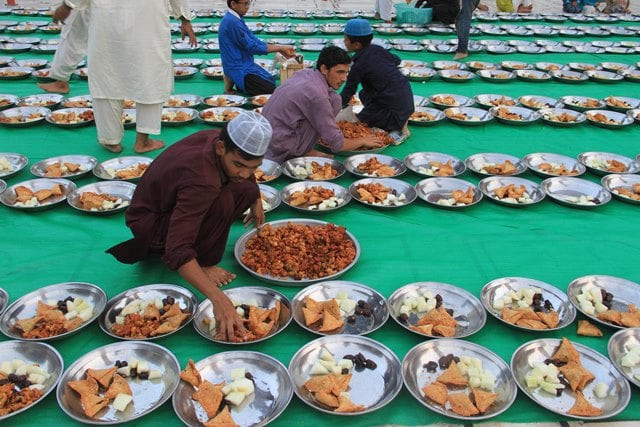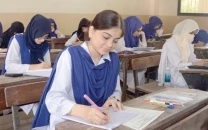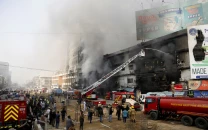Ramazan brings people of all faiths closer in Peshawar
Iftar gatherings arranged by minorities are fostering interfaith harmony

Besides other numerous benefits, the holy month of Ramadan also promotes interfaith harmony and social cohesion between Muslims and minorities by bringing them closer.
Strengthening the bond of love and friendship, the mass iftar gatherings in Ramazan with varieties of food, spicy dishes, sweets, fruits, and beverages by the fasting Muslims and minorities build a spirit of affection and brotherhood, besides leaving positive effects on humans for a long time.
Rawandar Singh, a 41-year-old Sikh, is all smiles and exudes a high spirit of sharing and compassion as he seeks solace in dolling out dates and ‘pakora’ among fasting Muslims during iftar on returning home from his shop in Hashtnagri Peshawar City.
Wearing the traditional turban, Rawandar Singh had been distributing packets of dates and other edible items among the fasting citizens at Hastnagri bazaar since 2012 after inheriting the notable practice from his father Awtah Singh.
“I feel inner peace and satisfaction while doing the noble practice in all 30 days of the holy month. The soothing moments of distributing iftaar’s items, including dates, pakora, jalebi, and other dishes, are still alive and fresh when I used to keenly observe my late father Awtah Singh handing over packets of food to Muslim brothers all along the way from Hastnagri to Mohalla Jogan Ramdas in the interior city,” Rawandar Singh told APP while distributing dates and pakora among the fasting Muslims ahead of iftar on Sunday.
He said that the distribution of food during Ramadan was their mark of respect and admiration for fasting Muslims’ brothers besides giving them inner peace and satisfaction.
Dewa Singh and his son Tajindar Singh, who are associated with the telecommunication business in Hastnagri Peshawar, said that inviting people of different faiths to iftar gatherings in Pakistan sends a strong message of love, brotherhood, and friendship to the whole world.
They said that without winning hearts and minds, people cannot come closer to each other and cannot develop a society whose inhabitants enjoy equal rights and respect for each other’s beliefs. They said that arranging iftar gatherings and Ramadan camps for Muslims was not a new practice for them.
"Our forefathers did the same thing to express warmth, love, and friendship to our Muslims brothers of Peshawar during Ramadan,” they said.
They also said that they were serving iftar to dozens of fasting persons on a daily basis and vowed to continue to do so in the remaining days of the month. Like other cities of Pakistan, roadside iftar gatherings are being seen at Qisa Khwani, University Road, Lady Reading Hospital, Takhto Jumat Cantonment, and Ramadas, where philanthropists invite people of different faiths in an environment of sharing, care, and friendship.
The iftar gatherings’ long sheets filled with dates, pakora, jalebi snacks, fruits, dahi bhalay, rice, meat, paye, chappli kabab, polao, and sweet beverages get fully occupied by the passerbys, laborers, and people of different schools of thought.
Haroon Sarbdayal, a representative of the Hindu community in Khyber Pakhtunkhwa (K-P) and a founding member of the Pakistan Council of World Religions, said that all prophets and founders of all religions had promoted peace, forgiveness, patience, love, and tolerance through their universal teachings, actions, and deeds.
“We need to promote acceptance along with tolerance because the former is more effective in establishing durable peace, patience, and pluralism in the society,” he said.
Ramadan is the month of tolerance and patience in which the Hindu community was arranging iftar gatherings for Muslim brothers in the province, he further said.
In Peshawar, a grand iftar gathering would be arranged in the last 10 days of Ramadan, wherein leaders of all religions would be invited, Sarbdayal said, adding that such noble practices were already being made in Sindh.
He said that misperceptions among followers of different faiths could be removed by enhancing interaction and dialogues among them. He suggested the establishment of common study centres for followers of all religions where they could interact and understand each other’s beliefs, besides organising iftar gatherings to bring people closer.
Highly appreciating the minorities’ goodwill gestures of arranging iftar gatherings and ‘iftar dastarkhwans’, he said these noble practices bring Muslims and minorities closer and enhance their understanding of each others’ faiths.
Professor Dr.Hifazat Ullah Khan, the chairman of the Islamiat department of Islamia College, Peshawar, said that interfaith harmony means bringing peace and tranquility among people through positivity and mutual coexistence.
He said that inviting each other to iftar gatherings cements bonds of love, friendship, and brotherhood among people of all religions, including Islam and Christianity.
“The Madina Charter had provided complete and unprecedented religious freedoms to the followers of all religions and there was a need for constant debate and discussion on its different clauses and articles for education for ensuring lasting peace and harmony in the world,” the professor said.
Terming charity as an important component of Islam, he said that it was more significant during Ramadan and people should give it to reputable charity organisations with excellent public service and clean accounts records.
He said that a list of reputable charity organisations was available on NECTA’s website, adding that extra care should be made by people so that their charity does not get into the wrong hands.
The charitable initiatives such as arranging mass iftar gatherings and Ramdan camps will not only strengthen the bonds of love and friendship but would also help bring people closer, he further said.
The academic said that Ramadan was the best month for charity and Zakat with countless blessings for Muslims.



















COMMENTS
Comments are moderated and generally will be posted if they are on-topic and not abusive.
For more information, please see our Comments FAQ